Abstract
The study presents how the position vis-s-vis of the discipline of History has changed during the class of Didactics of History. At the beginning of the semester, knowing about the History only from their own experience as pupils, we’ve measured the attachment of the students from the Pedagogy of Primary and Pre-school Education from Education Science, Faculty of Letters, University of Craiova, to this discipline. The target group were the students from the third year of study from 2015/2016 and 2016/2017 promotion. The total number of participants was of 52 students. At the end of the semester, after revealing them the new methods of history’s didactics we’ve repeat the questionnaire to see if anything changed in their perception and attitude. The importance of this study resides in the fact that a teacher, weather he likes or not a certain subject, he influences its pupils through his attitude, so it is important for them to know and appreciate, especially a discipline like History. The study also reveals the importance of the new methods of teaching face to the old ones. For History, this translates through emphasise the story and the relations between facts in oppose with the memorise of dates and facts.
Keywords: Didactics of historynew teaching methodspedagogyeducation
Introduction
History is us, each and every one and all together - all that we have thought, we have achieved or lived. The existence of each of us, individually or collectively, imprints the existence and evolution of the planet, either on a micro or macro scale. History is the memory given to us by the past to live the present and build the future.
History teachers are the ones to initiate students on the path of dusting and understanding the past. The emphasis should be on not the infinite memory of data, but the explanation and understanding of the facts, the problems, the causes and the consequences. It also has to implement the essential milestones (facts and facts) for knowing the past. I suggest you an analogy.
Problem Statement
In mathematics, if a teacher insists only on memorizing certain formulas, theorems, axioms, etc. without emphasizing how they should be used to solve problems / exercises, then the information the student keeps becomes almost useless, and they cannot be put into practice. The same idea holds true for history. But, as with mathematics, a problem cannot be solved if certain formulas are not known and understood, as in the case of history there is basic information to be assimilated to understand and problem-solving more complex issues.
Research Questions
One of the most important aspects that the history teacher has to consider is learning the pupils of certain values in terms of history - social, cultural, human, personal, professional values. Assessment for Primary Classes is no longer aimed at student hierarchy. Emphasis should be placed on developing skills and competencies (Stoian, 2016, p. 213).
Although the literature related to the didactics of History is a very good one, having a very large research papers and studies focusing on how to teach History in a new and interesting way, it seems that in classroom, teachers don’t have a custom yet to use it (Adăscăliței & Bercea, 2013, p. 67).
Purpose of the Study
Unfortunately, many teachers emphasis the memorize of dates, this being the only learning method used in the classroom. That’s way, most of the pupils reject this discipline (Căpiță, & Căpiță, 2005, p. 49).
The study presents how the position vis-s-vis of the discipline of History has changed during the class of Didactics of History. The main purpose was to see if, by showing them different new methods of learning and teaching History, they change their primarily impression regarding this discipline. If so, then this would be the perfect example for them to follow themselves in when in classroom, having a positive impact on long term on how people connect with History;
Research Methods
We’ve conducted a poll at the beginning of the semester, looking to see how the students from Pedagogy of Primary and Pre-school Education from Education Science, Faculty of Letters, University of Craiova relates to history. The study has been applied to the students from the third year of study from 2015/2016 and 2016/2017 promotion. The total number of participants was of 52 students.
The questionnaire had three questions:
What was your favourite discipline in high school?
Do you think history is important?
Why don’t you like history? / Why do you like history?
The third question has two parts because each part correspond to a direction given by the answer at question no.2
Findings
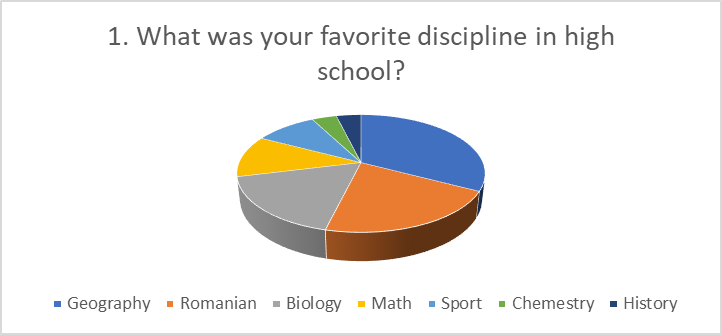
From their answers to the first question we can observe that the majority liked geography, and surprisingly mathematics has a better score than history. More concrete 17 of them answered they liked Geography, 11 of them Romanian, 9 of them Biology, 6 of them Math, 5 of them Sports and 2 of them Chemistry and 2 of them History.
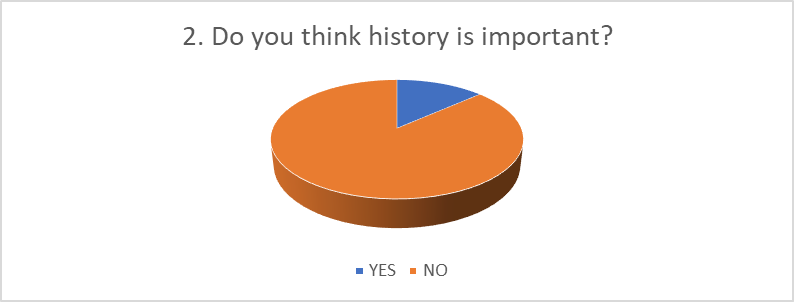
As for the second question, 45 students answered they do not see history as important, while only seven of them thought history has some importance.
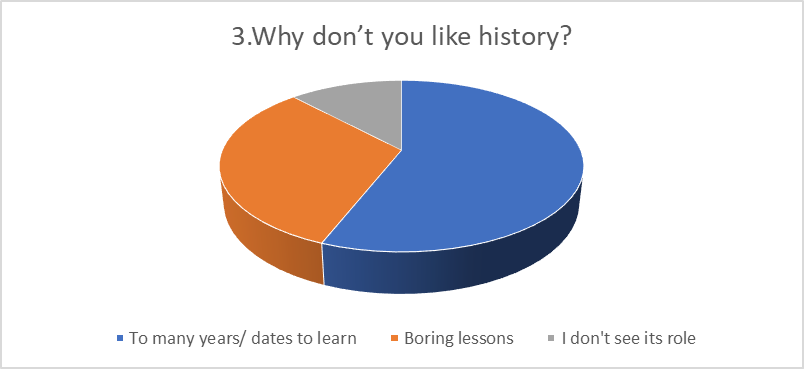
During the class of Didactics of History, we have tried to offer them a distinct perspective on History, both on methods of teaching it as well as in emphasizing the importance to our daily life of knowing history.
We’ve highlighted the correlation between History and Geography, Culture, Peace Education, Law, Social Values and even disciplines like Sports or Math. For instance, even from Herodot – the father of History – we can find connections with geography “The Egyptians living under such a heaven and alongside a river so distinct from the others have established their customs and laws which, in many respects, knock their head together with those of other nations” (Herodot, 1961, p. 234).
Also, we showed them new methods for teaching history, having in mind all the time the Recommendation 15/2001 of Council of Europe, along with the innovative ideas of teaching like virtual learning communities such as Edmodo or Schoololgy that can increase student performance (Strungă, Bunăiașu, 2016, p. 224) or ideas like learning history by playing trivia games or accessing online platforms like Age of Empires and, for instance, rebuilding a mediaeval society.
At the end of the semester, we’ve asked the students to answer our last two questions from the initial questionnaire again, and the results were the following:
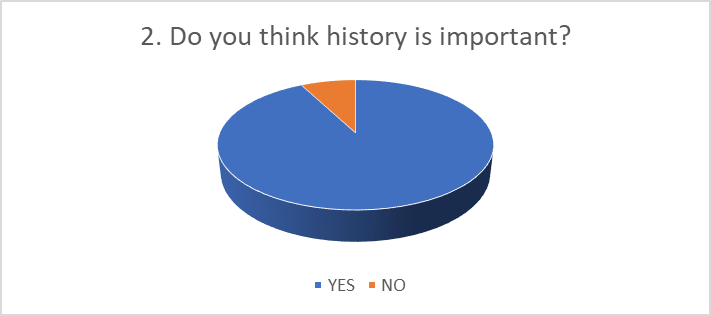
It is very important to highlight the fact that, the statistics for the second question were radically changed at the end of the semester. 92% - meaning 48 of the students participating at this study – came to think that History it is, after all, important.
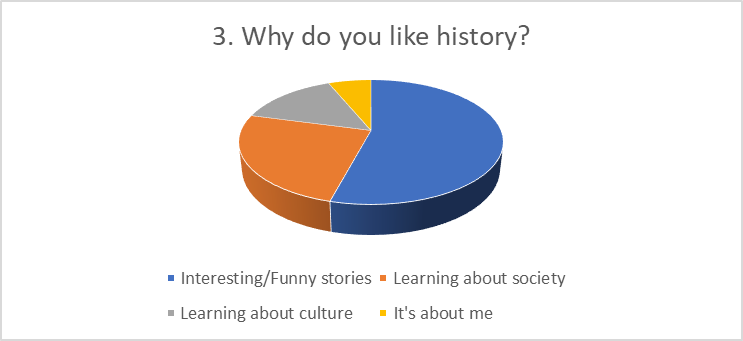
26 of them answered that they like history now because they’ve discovered it’s not about only numbers and dates, but it is about interesting and sometimes funny stories. Twelve of them answered they like history because they can learn about society, how it works and how they can make a change. Learning about culture was the answer given by seven students, while three of them said that they like History because it is about them.
Conclusion
We can observe a radical change of their position vis-à-vis History. One of the most interesting answers is the one from the third question,
The importance of this study resides in the fact that a teacher, weather he likes or not a certain subject, he influences its pupils through his attitude, so it is important for them to know and appreciate, especially a discipline like History. The study also reveals the importance of the new methods of teaching face to the old ones. For History, this translates through emphasise the story and the relations between facts in oppose with the memorise of dates and facts
References
- Adăscăliței, F., Bercea, M., et all., (2013). Elemente de didactică a istoriei, Bucureşti, Editura Nomina.
- Căpiță, L., Căpiță, C., (2005). Tendințe în didactica istoriei, Bucuresti, Editura Paralela 45
- Herodot, (1961). Istorii, București, Editura Științifică
- Stoian, A., (2016). Impactul metodelor complementare de evaluare asupra performanțelor școlare ale elevilor din învățământul preuniversitar, București, Editura Universitară,
- Strungă, A., Bunăiașu, C., (2016). The use of new information and communication technologies by students of primary and preschool pedagogy specialization from the university of craiova, in The Proceedings of CIL 2016: Third Edition of International Conference of Humanities and Social Sciences – Creativity, Imaginary, Language, Craiova, Romania, Editura Sitech, ISBN 978-606-11-4798-4.
Copyright information

This work is licensed under a Creative Commons Attribution-NonCommercial-NoDerivatives 4.0 International License.
About this article
Publication Date
28 June 2018
Article Doi
eBook ISBN
978-1-80296-040-2
Publisher
Future Academy
Volume
41
Print ISBN (optional)
-
Edition Number
1st Edition
Pages
1-889
Subjects
Teacher, teacher training, teaching skills, teaching techniques, special education, children with special needs
Cite this article as:
Daniela, O. (2018). Teaching Students From Pedagogy Of Primary And Pre-School Education To Appreciate History. In V. Chis, & I. Albulescu (Eds.), Education, Reflection, Development – ERD 2017, vol 41. European Proceedings of Social and Behavioural Sciences (pp. 566-571). Future Academy. https://doi.org/10.15405/epsbs.2018.06.66

